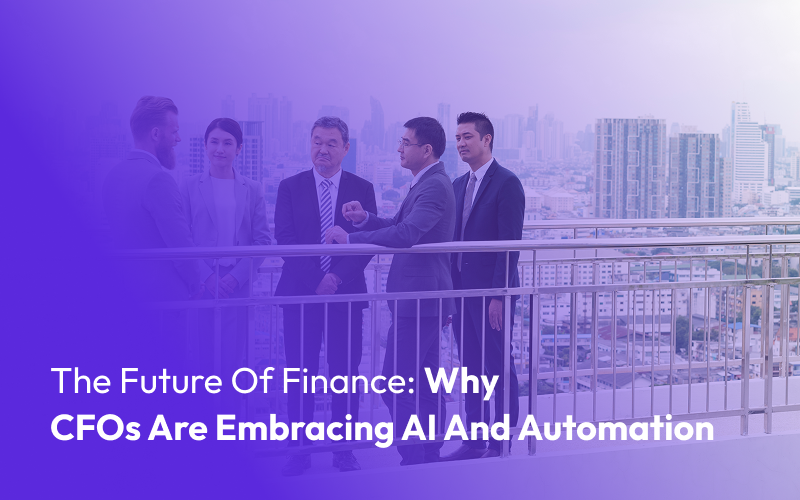The financial function is no longer about closing books and filing reports. It’s about using technology to drive strategic decisions, predict cash flow challenges, and optimize margins before problems emerge.
CFOs embracing AI automation understand this shift isn’t optional anymore.
Forward-thinking CFOs are deploying AI in finance departments to automate routine tasks, uncover insights buried in data, and free up their teams to focus on strategy instead of spreadsheet maintenance.
And no, this isn’t about replacing human judgment. Rather, it’s about amplifying it. The best finance leaders understand that finance automation doesn’t eliminate their role but elevates it. They’re moving from scorekeepers to strategic partners, from reactive reporters to proactive advisors.
Let’s take a look at how AI impacted the finance and accounting industry and how CFOs take advantage of this modern technology.
Recent Developments in AI and Finance Automation
The transformation of finance through AI isn’t theoretical anymore. It’s happening now, and the pace is accelerating.
Finance automation tools now process invoices with near-perfect accuracy, reconcile thousands of transactions simultaneously, and flag anomalies that would take human analysts hours to identify.
On the other hand, AI-powered robotic process automation (RPA) integrates seamlessly with existing enterprise resource planning (ERP) systems, creating straight-through processing for routine transactions while escalating exceptions for human review.
The sophistication has jumped dramatically.
Where first-generation tools required extensive setup and constant maintenance, modern AI finance solutions learn from historical patterns, adapt to changing business conditions, and improve their accuracy over time. With this capability, machine learning algorithms are able to recognize vendor patterns, predict payment behaviors, and even suggest optimal cash management strategies based on historical performance and market conditions.
Real-time data processing has also become the standard. Finance teams no longer wait for the month-end close to understand performance, thanks to the ability of AI-driven dashboards to provide continuous visibility into cash flow, margin trends, and operational KPIs.
Most accounting software have incorporated automation into their systems. Integrations become easier, whether it’s your CRM tools, project management software, or operational databases. This allows you to have a unified view of business performance that was once impossible with traditional siloed systems.
How CFOs Benefit from AI and Automation
CFOs who have realized the importance of integrating AI and automation into business operations are set to achieve the following benefits:
- Operational Efficiency That Actually Moves the Needle
AI in finance departments eliminates the time-consuming manual work that bogs down talented professionals.
Accounts payable processing that once required hours of data entry and verification now happens automatically. Invoice matching, approval routing, and payment processing occur without human intervention.
As automation happens, finance teams regain their time to focus on analysis and strategy.
- Real-Time Financial Visibility for Better Decisions
Modern CFOs demand visibility, not just reports. Through the use of AI-powered dashboards, they can achieve continuous monitoring of cash flow, receivables aging, and expense patterns.
This real-time insight enables proactive management rather than reactive problem-solving. In other words, problems get flagged before they impact operations.
- Predictive Analytics That Prevent Financial Surprises
Cash flow forecasting moves from educated guesswork to data-driven precision.
CFOs can streamline the entire process through the use of AI as it’s capable of analyzing:
- Historical patterns
- Seasonal variations
- External factors to predict future cash positions
The result? CFOs are able to spot potential shortfalls weeks in advance and take corrective action before problems materialize.
- Fraud Detection and Risk Management
Finance automation includes sophisticated fraud detection capabilities that human analysts might miss.
AI systems monitor transaction patterns, identify unusual activities, and flag potential security breaches in real time. This proactive approach prevents financial losses and protects company assets more effectively than traditional periodic audits.
- Enhanced Regulatory Compliance and Reporting
Compliance requirements continue to multiply, and manual processes can’t keep pace.
But through the use of AI-driven compliance tools, CFOs can still keep up with regulatory changes. Automation allows them to ensure proper documentation and generate accurate reports with minimal human intervention.
It’s like hitting two birds in one stone: Reducing compliance risk and freeing up resources for strategic initiatives.
Specific Areas Where CFOs Use AI and Automation
When it comes to automation, people would immediately think of using it on repetitive and time-consuming processes.
Yes, those areas are always first in line, especially when your goal is to free up more resources. But limiting yourself to those areas also limits what AI can do for you.
CFOs utilize AI in streamlining repetitive tasks and completing their strategic work, as follows:
- Accounts Payable and Invoice Processing
With AI and automation, CFOs move from slow approvals to seamless accounts payable. Smart tools read invoices, verify terms, and send them straight through when everything checks out. Exceptions surface quickly, so errors get resolved before they stall payments. Suppliers are paid on time, relationships improve, and finance teams breathe easier.
AI also provides real-time visibility into spending patterns. CFOs enjoy more control, fewer surprises, and the ability to focus on driving growth rather than chasing paperwork.
- Financial Reporting and Month-End Close
CFOs are using AI and automation to cut the stress out of financial reporting and the month-end close. Instead of waiting weeks for numbers to align, they see real-time data roll in with accuracy and speed.
Systems pull information from multiple sources, reconcile accounts, and flag issues before they delay the close. Reports that once took endless spreadsheets are now generated in a fraction of the time. Teams focus on analysis and insights rather than manual checks.
For CFOs, the result is sharper decision-making, greater confidence in the numbers, and a close process that finally keeps up with the business.
- Cash Flow Management and Treasury Operations
CFOs use AI and automation to reimagine treasury operations.
Forecasts shift from static reports to dynamic insights. Liquidity stays visible, cash reserves work harder, and capital allocation supports growth.
This transformation delivers speed, accuracy, and confidence.
- Expense Management and Employee Reimbursements
CFOs are done chasing receipts and waiting on slow approvals.
With AI and automation, expense management runs itself. AI checks receipts, flags out-of-policy claims, and keeps everything clean. Automation also pushes approvals through fast and makes reimbursements land on time.
This kind of streamlined process gives CFOs real visibility into spending while employees stop stressing about delays. It is smarter, faster, and far less painful for everyone.
- Financial Planning and Analysis (FP&A)
FP&A is where CFOs turn numbers into decisions. It is not just about building budgets or forecasts, it is about seeing patterns, spotting risks, and guiding strategy.
With the right use of AI tools, finance teams move from reactive reporting to proactive insight. They connect data across the business, model different outcomes, and give leaders the clarity to act with confidence. FP&A becomes less about crunching spreadsheets and more about steering growth with precision.
- Audit and Internal Controls
Audit and internal controls provide the discipline every business needs. They safeguard assets, enforce accountability, and bring clarity to decision-making. CFOs now use automation to streamline testing, track compliance, and make audits become smoother, faster, and far more insightful.
Potential Downsides of AI and How CFOs Mitigate Risks
AI is not a quintessential solution that would magically resolve your financial woes. Like other business tools, it requires the right expertise to ensure proper use.
If used carelessly or with limited knowledge, it can become a liability instead of an asset.
Here are some of the potential downsides of using AI and how CFOs step in to mitigate risks.
- Unreliable Results
AI systems are only as reliable as the data they process. If the quality of data is poor, AI would only amplify mistakes rather than eliminating them.
The CFO Solution:
To prevent unreliable results, CFOs implement data governance frameworks, establish clear data entry standards, and maintain regular data quality audits.
- Cybersecurity and Data Privacy Risks
Increased automation creates more potential entry points for cyber attacks. Financial data, in particular, represents a prime target for bad actors.
The CFO Solution:
CFOs implement robust cybersecurity frameworks, regular security assessments, and comprehensive staff training to mitigate cybersecurity and data privacy risks. With the increased use of AI in the organization, CFOs see to it that data encryption, access controls, and monitoring systems become essential components of the finance technology stack.
- Over-Reliance on Technology Without Human Oversight
AI brings speed and accuracy to accounting, but over reliance without human oversight is risky. Machines can miss context, overlook compliance nuances, or misread data. Numbers may look clean, yet errors slip through.
The CFO Solution:
CFOs maintain balance by establishing clear escalation procedures, implementing regular human review processes, and ensuring staff maintain the skills needed to understand and validate automated outputs. Human judgment keeps finance grounded in accuracy, ethics, and accountability.
- Resistance to Change and Staff Displacement Concerns
When automation enters finance, pushback is common. Teams worry about job security or doubt new systems.
The CFO Solution:
CFOs address this through transparent communication about how automation enhances rather than replaces human capabilities. However, it’s not limited to information dissemination alone.
CFOs also develop retraining programs to help staff build new skills. With training and clarity, staff shift from manual work to higher-value tasks, and the entire finance function grows stronger.
- Regulatory and Compliance Uncertainties
AI and automation in accounting promise efficiency, but unclear regulations create risk. Laws evolve slowly while technology advances quickly, creating gray areas. Misaligned processes can lead to unintentional violations, financial penalties, or reputational damage. Without clear oversight, companies risk compliance gaps despite aiming for efficiency and accuracy.
The CFO Solution:
CFOs address regulatory and compliance uncertainties by staying ahead of evolving rules, setting strong governance policies, and keeping AI processes transparent. They work closely with legal and compliance experts to align systems with current standards. At the same time, training finance teams ensures responsible use, reducing risk while strengthening trust in reporting.
AI brings powerful opportunities, but it is not without its challenges. CFOs who succeed know that managing risk is just as important as unlocking efficiency. With the right balance of governance, expertise, and human judgment, AI becomes less of a risk factor and more of a competitive advantage.
Ready to Transform Your Finance Function?
The transformation of finance through AI and automation isn’t a distant future scenario. It’s happening now, and the businesses that adapt quickly will gain sustainable competitive advantages over those that wait.
Here at Bennett Financials, service businesses can find the financial infrastructure and strategic guidance they need to leverage both human expertise and technological capabilities. We understand that successful implementation requires more than just buying software. It requires strategic planning, proper integration, and ongoing optimization to deliver real business value.
Our clients don’t just automate their existing processes. They redesign their financial operations to take advantage of AI capabilities while maintaining the strategic oversight that drives business growth. We provide the CFO-level expertise needed to evaluate technologies, implement solutions, and optimize performance over time.
If you’re ready to move beyond reactive financial management and build a finance function that actively contributes to business success, let’s talk. The difference between traditional finance and AI-powered strategic finance isn’t just operational. It’s transformational.
Ready to build the financial infrastructure that supports the business you’re trying to create? Contact Bennett Financials and let’s design a strategic finance function that leverages the best of human insight and artificial intelligence.


